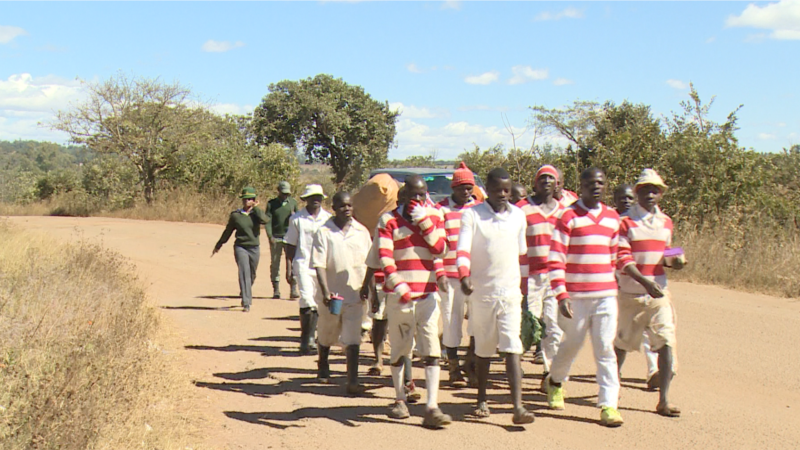This website uses cookies so that we can provide you with the best user experience possible. Cookie information is stored in your browser and performs functions such as recognising you when you return to our website and helping our team to understand which sections of the website you find most interesting and useful.
 Rights organizations in Zimbabwe are concerned about what they say is a crackdown against opposition activists by the government of President Emmerson Mnangagwa. They cite the recent arrest of seven activists who were detained when they returned home from a conference in the Maldives. Makomborero Haruzivishe leaves Zimbabwe's maximum security prison where he was visiting the seven detained activists who are being held on treason charges. He is a family friend of one of them, 37-year-old Tatenda Mombeyarara. “It's a baseless charge. It's a charge that they are using to crack down on human rights defenders and civil society in Zimbabwe,” Haruzivishe said. “But the reality on the ground is that the economy is in tatters. Tempers within the country are high, so the government throws fear into people, to pacify them. They are going for opposition people. They are going for leading civic organizations in order to pacify them in case of any peace mass action.” On Monday, Zimbabwe's justice minister, Ziyambi Ziyambi, told VOA that he would not comment on the seven activists, as their case was now in court. The seven were arrested last month on arrival at Harare International Airport on their return from attending a workshop in the Maldives. The government says the workshop taught them tactics to overthrow President Emmerson Mnangagwa's government — an offense which carries a sentence of up to 20 years in prison in Zimbabwe. Haruzivishe said nothing much has changed since Zimbabwe President Robert Mugabe's regime ended in 2017. “Change is there, but is for the worse, to be honest,” Haruzivishe said. “In the Mugabe era, we were more of a police state. But now, we are under a military state. If you check on the charges, they are being accused of being trained in small arms — that's a military intelligence operation where you give people military-linked charges so that you can deal with them in military manner." Kumbirai Mafunda from the Zimbabwe Lawyers for Human Rights is hopeful that the high court will release the activists on bail later this week. "We believe that these people did not commit any crime or offense according to Zimbabwe law,” Mafunda said. “They enjoy several of their fundamental rights. We believe that this is one of the several cases which we have seen (for) a couple of years which we have seen the government going down on the work of civil society.” Arresting opposition activists was a common tactic used by Mugabe during his 38 years in power. Human rights groups want to see the charges against the seven activists now in jail dropped. Read More
Rights organizations in Zimbabwe are concerned about what they say is a crackdown against opposition activists by the government of President Emmerson Mnangagwa. They cite the recent arrest of seven activists who were detained when they returned home from a conference in the Maldives. Makomborero Haruzivishe leaves Zimbabwe's maximum security prison where he was visiting the seven detained activists who are being held on treason charges. He is a family friend of one of them, 37-year-old Tatenda Mombeyarara. “It's a baseless charge. It's a charge that they are using to crack down on human rights defenders and civil society in Zimbabwe,” Haruzivishe said. “But the reality on the ground is that the economy is in tatters. Tempers within the country are high, so the government throws fear into people, to pacify them. They are going for opposition people. They are going for leading civic organizations in order to pacify them in case of any peace mass action.” On Monday, Zimbabwe's justice minister, Ziyambi Ziyambi, told VOA that he would not comment on the seven activists, as their case was now in court. The seven were arrested last month on arrival at Harare International Airport on their return from attending a workshop in the Maldives. The government says the workshop taught them tactics to overthrow President Emmerson Mnangagwa's government — an offense which carries a sentence of up to 20 years in prison in Zimbabwe. Haruzivishe said nothing much has changed since Zimbabwe President Robert Mugabe's regime ended in 2017. “Change is there, but is for the worse, to be honest,” Haruzivishe said. “In the Mugabe era, we were more of a police state. But now, we are under a military state. If you check on the charges, they are being accused of being trained in small arms — that's a military intelligence operation where you give people military-linked charges so that you can deal with them in military manner." Kumbirai Mafunda from the Zimbabwe Lawyers for Human Rights is hopeful that the high court will release the activists on bail later this week. "We believe that these people did not commit any crime or offense according to Zimbabwe law,” Mafunda said. “They enjoy several of their fundamental rights. We believe that this is one of the several cases which we have seen (for) a couple of years which we have seen the government going down on the work of civil society.” Arresting opposition activists was a common tactic used by Mugabe during his 38 years in power. Human rights groups want to see the charges against the seven activists now in jail dropped. Read More



 Africana55 Radio
Africana55 Radio 
